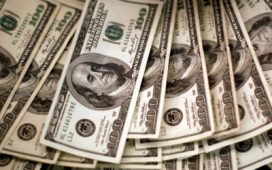TOKYO : The yen gave up ground in early trade on Thursday, reversing direction after a sudden surge against the dollar overnight that traders and analysts were quick to attribute to intervention by Japanese authorities.
The dollar was 0.9 per cent higher at 155.98 yen as of 0100 GMT, retracing about half of its late Wednesday surge from around 157.55 to exactly 153 over a period of about 30 minutes.
The sharp overnight move came in a quiet period for markets after Wall Street had closed and hours after the Federal Reserve had wrapped up its policy meeting, with Chair Jerome Powell reiterating that sticky inflation meant interest rate cuts may be a while in coming.
When contacted by Reuters, Japan’s vice finance minister for international affairs, Masato Kanda, who oversees currency policy, said he had no comment on whether Japan had intervened in the market.
“It caught markets off guard because, obviously, it happened in the U.S. session and seemed to be timed with the FOMC to take advantage of a weaker dollar,” said Kyle Rodda, senior financial market analyst at Capital.com in Melbourne.
“The ‘sneak attack’ element really is the MOF (Japan’s Ministry of Finance) looking to punish speculators and send a warning about shorting the yen.”
The dollar remains up more than 10 per cent against the yen this year, as traders push back expectations on the timing of a first Fed rate cut, while the Bank of Japan has signalled it will go slow with further policy tightening after raising rates for the first time since 2007 in March.
The gap between long-term government bond yields in the two countries is a yawning 376 basis points. That helped lift the dollar to a 34-year peak of 160.245 yen on Monday and also spurred a sharp reversal which official data suggested was due to Japanese intervention totalling about $35 billion.
The dollar index, which measures the currency against the yen, euro and four other major peers, ticked up 0.07 per cent to 105.78 on Thursday, following a 0.56 per cent retreat on Wednesday from near six-month highs.
The euro was little changed at $1.071025, after climbing 0.45 per cent in the previous session.
Sterling was steady at $1.2530, following a 0.28 per cent rise a day earlier.
The dollar was already on the back foot before the yen’s spike, after Fed Chair Powell reiterated the central bank’s bias for easing policy – even if the timing has been delayed – while giving no sign that further rate hikes are under consideration.
“There was a collective sigh of relief in the financial markets after the Fed refrained from increasing its hawkishness,” said Jack Mclntyre, portfolio manager for global fixed income and related strategies at Brandywine Global.
“Think of this outlook as ‘high for longer’ as opposed to ‘higher for longer.’ The latter implies rate hikes, which is not today’s story.”







